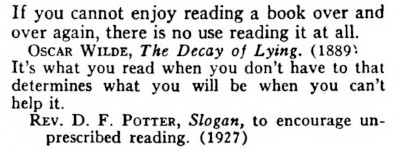Oscar Wilde? Charles Francis Potter? Mabel C. Wolcott? Anonymous?

Question for Quote Investigator: The famous wit Oscar Wilde was an avid reader and an excellent classicist. The following statement has been attributed to him:
It is what you read when you don’t have to that determines what you will be when you can’t help it.
I am skeptical of this ascription because I haven’t been able to find a citation. Would you please help?
Reply from Quote Investigator: This remark is not listed in the valuable compendium “The Wit & Wisdom of Oscar Wilde” assembled by quotation expert Ralph Keyes.1 QI believes that the attribution to Oscar Wilde is mistaken. The discussion accompanying the 1948 citation given further below suggests one possible mechanism for the error.
QI thinks that the prominent Unitarian minister Charles Francis Potter deserves credit for the remark under analysis. In June 1927 a newspaper in Burlington, Vermont reported that Potter had spoken to members of the local Athena Club on the topic of “Books and the Home”, and he used a version of the expression. Emphasis added to excerpts by QI:2
“What you read when you don’t have to, determines what you will be when you can’t help it,” according to Mr. Potter. Libraries must be for the people and they must be accessible. He believes as much should be spent for the libraries as is for the streets.
Here are additional selected citations in chronological order.
In August 1926 the “Pittsburgh Gazette Times” of Pennsylvania published a collection of miscellaneous sayings under the title “Out of the pepper box”. An interesting precursor statement was included:3
What you do when you have nothing to do very surely determines what you will eventually have to do.
The precursor above was not specifically about reading. Yet, it matched the two part template. The first part was about choices, and the second part was about the consequences. The first part began with “What you”, and the second part used the keyword “determines”. The quotation being explored may have evolved from this precursor, or the expressions may be unrelated.
The precursor appeared in other newspapers in 1926 such as the “Orlando Morning Sentinel” of Florida4 and “The Freeport Journal-Standard” of Illinois.5
In April 1927 Charles Francis Potter visited Ohio and delivered an address to students as reported in the “Dayton Daily News”. The newspaper printed a garbled version of the saying. The word “determine” probably should have been the phrase “that determines”:6
“It is what you read when you don’t have to determine what you will be when you can’t help it,” Charles Francis Potter told students of the schools, whom he urged to read more books than they were compelled to by their course of study.
Also in April 1927 the “Hamilton Evening Journal” of Ohio credited Potter with a truncated version of the saying that did not include the final word:7
“What you read when you don’t have to, determines what you’ll be when you can’t help,” said Charles F. Potter, to Hamilton high school students the other day. Mr. Potter is a lecturer for the National association of Book Publishers…
In June 1927 “The Burlington Free Press” of Vermont printed a grammatical version of the remark from Potter as mentioned previously:
“What you read when you don’t have to, determines what you will be when you can’t help it,” according to Mr. Potter.
In 1933 a Hanover, Pennsylvania newspaper published “Public Library Notes” by librarian Mabel C. Wolcott who mentioned the saying. She noted that it had been publicly posted, but the words were anonymous:8
“It is what you read when you don’t have to that determines what you will be when you can’t help it.” (Legend displayed on the wall of the Kipling room in the Toronto Public Library.)
In 1948 “The Macmillan Book Of Proverbs, Maxims, and Famous Phrases” included a section listing quotations about reading. A quotation from Oscar Wilde appeared adjacent to a quotation from D. F. Potter. The “D” was likely a typo for “C”. The text is given below together with an image showing the typographical closeness of the two quotations:9
If you cannot enjoy reading a book over and over again, there is no use reading it at all. Oscar Wilde, The Decay of Lying. (1889)
It’s what you read when you don’t have to that determines what you will be when you can’t help it. Rev. D. F. Potter, Slogan, to encourage unprescribed reading. (1927)

QI conjectures that one or more readers of this reference work incorrectly looked above the second quotation to determine its attribution and assigned the words to Oscar Wilde. This mistake fits into a category called textual proximity errors. A quotation is scooped up and reassigned to a well-known name that appears nearby in the text.
In 1952 the “Wilson Library Bulletin” published the following flawed information as a filler item:10
It is what you read when you don’t have to that determines what you will be when you can’t help it.
—OSCAR WILDE
In 1987 the “Great Falls Tribune” of Montana used the same saying as an epigraph to an article while crediting Oscar Wilde.11
In conclusion, Charles Francis Potter should receive credit for this saying which he used multiple times. QI suggests using the June 1927 version. The ascription to Oscar Wilde is spurious.
Image Notes: Picture of open books displaying pages from Free-Photos at Pixabay. Image has been cropped and resized.
Acknowledgement: Great thanks to Andy Behrens whose inquiry led QI to formulate this question and perform this exploration. Behrens found a 1954 citation ascribing the quotation to Oscar Wilde.
Update History: On April 6, 2025 the format of the bibliographical notes was updated.
- 1996, The Wit & Wisdom of Oscar Wilde, Edited by Ralph Keyes, (Quotation “…what you read when…” not found during search), HarperCollins Publishers, New York. (Verified with hardcopy) ↩︎
- 1927 June 7, The Burlington Free Press, Says Highbrows Are in Need of Education, Quote Page 7, Column 3, Burlington, Vermont. (Newspapers_com) ↩︎
- 1926 August 16, Pittsburgh Gazette Times, Out of the pepper box, Quote Page 18, Column 2, Pittsburgh, Pennsylvania. (Newspapers_com) ↩︎
- 1926 September 16, Orlando Morning Sentinel, (Filler item), Quote Page 2, Column 6, Orlando, Florida. (Newspapers_com) ↩︎
- 1926 December 21, The Freeport Journal-Standard, (Filler item), Quote Page 3, Column 2, Freeport, Illinois. (Newspapers_com) ↩︎
- 1927 April 4, Dayton Daily News, Influences of Books Outlined: Noted Librarian Urges School Students to Increase Reading, Quote Page 28, Column 2, Dayton, Ohio. (Newspapers_com) ↩︎
- 1927 April 9, Hamilton Evening Journal, Here and There, Quote Page 6, Column 6, Hamilton, Ohio. (Newspapers_com) ↩︎
- 1933 March 2, The Evening Sun, Public Library Notes by Mrs. Mabel C. Wolcott (Librarian), Quote Page 4, Column 6, Hanover, Pennsylvania. (Newspapers_com) ↩︎
- 1948, The Macmillan Book Of Proverbs, Maxims, and Famous Phrases, Selected and Arranged by Burton Stevenson, Topic: Reading, Quote Page 1939, The Macmillan Company, New York. (Verified with scans) ↩︎
- 1952 June, Wilson Library Bulletin, Volume 26, Number 10, (Filler item), Quote Page 834, Column 2, H. W. Wilson Company, New York. (Verified with hardcopy) ↩︎
- 1987 February 15, Great Falls Tribune, Tales of childhood remembered vividly by Terry Dwyer (Tribune Managing Editor), Quote Page E1, Column 1, Great Falls, Montana. (Newspapers_com) ↩︎